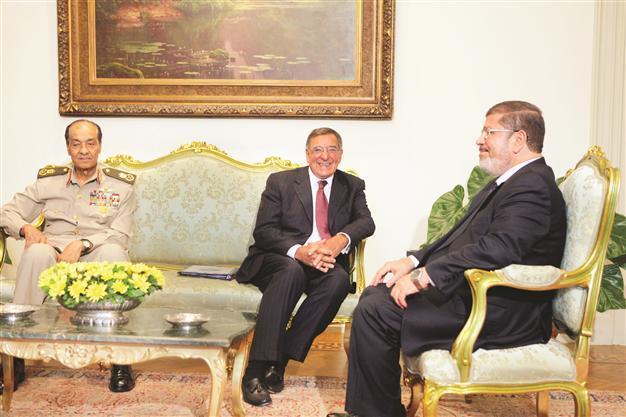Egypt, US to share intel after Sinai attack: Report
WASHINGTON

Egypt’s President Mohamed Morsi (R) meets with US Secretary of Defense Leon Panetta (C) and leader of Egypt’s military Hussein Tantawi, in Cairo. AP photo
The United States and Egypt are trying to put together a new security assistance package to address the worsening situation in the Sinai Peninsula, The New York Times reported late Aug. 11.The Egyptian military has been bolstering its presence in Sinai with tanks and helicopters after an unprecedented ambush on Aug. 5 on a border guard outpost near the borders of Gaza and Israel, which left 16 Egyptian soldiers dead.
The U.S. Department of Defense is discussing with the Egyptians a series of options for sharing intelligence with Egypt’s military and police in Sinai, the daily said, citing unnamed officials.
This intelligence includes intercepts of militants’ cell phone or radio conversations and overhead imagery provided by piloted aircraft, drones, and satellites, the report said. “We continue to discuss ways of increasing and improving the Egyptians’ situational awareness in the Sinai,” the paper quoted a Pentagon official as saying.
Tunnel concessions
U.S. Secretary of State Hillary Clinton, who was traveling in Africa last week, spoke by telephone with new Egyptian Prime Minister Hisham Qandil to discuss assistance, the paper noted. Egyptian security forces continued its crackdown yesterday, killing seven suspected militants during raids on hideouts in two villages in Sinai, according to the Associated Press. Meanwhile, the Palestinian Authority, led by Mahmoud Abbas, has for the first time publicly called for the destruction of underground tunnels in the region, asking Egypt to destroy those along its border with Gaza to tighten the blockade, Israeli daily Jerusalem Post reported.
Palestinian officials said the tunnels did not contribute to the economy in the Gaza Strip and were being used only by a small number of people for personal gain. Hamas also announced that it would be willing to close all tunnels between the Sinai Peninsula and the Gaza Strip on condition that the Rafah crossing would remain permanently open for crossing of people and commodities, another Israeli daily Haaretz reported.
Speaking at a press conference, Salah al Bradawi, one of Hamas leaders in Gaza, said that the perpetrators of last week’s attack did not originate from the Gaza Strip and that the attack had no connection to Hamas. The government in Cairo has brought armoured vehicles, tanks and hundreds of extra troops into Sinai following the deadly attacks.
















